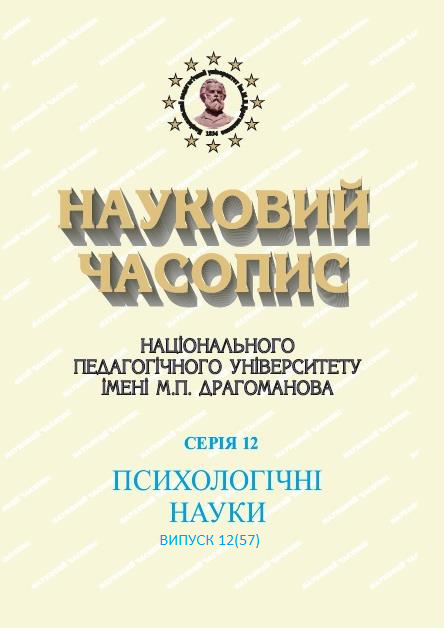ОСОБЛИВОСТІ КОМУНІКАТИВНОЇ МЕДІАКОМПЕТЕНТНОСТІ СУЧАСНИХ ПСИХОЛОГІВ – СТУДЕНТІВ І ПРАКТИКІВ
DOI:
https://doi.org/10.31392/NPU-nc.series12.2020.12(57).08Ключові слова:
комунікація, комунікативна медіакомпетентність психолога, комунікативні здібності, медіакомпетентність, студенти-психологиАнотація
В статті розкрито результати теоретичного та емпіричного дослідження комунікативної медіакомпетентності майбутнього психолога. Уточнено зміст понять «комунікативна компетентність психолога» і «комунікативна медіакомпетентність» психолога та визначено структурні компоненти комунікативної медіакомпетентності майбутнього психолога (когнітивний, емоційний, поведінковий, медіакомпетентність, що містить технічні (цифрові), психологічні та маркетингові ЗУН). Емпіричне дослідження було проведено в період з 2019 по 2020 рік. У ньому взяли участь дві вибірки: психологи-практики (n=62) та студенти-психологи 3-6 курсів навчання (n=277). Нами був підібраний банк методик, який дозволив оцінити й порівняти рівень розвитку комунікативної медіакомпетентності психологів-практиків і студентів-психологів: «Методика оцінки комунікативних та організаторських здібностей (КОЗ-2)» і авторська анкета для дослідження професійної медіакомпетентності психолога «Професійна медіакомпетентність психолога». Встановлено, що лише 7% психологів-практиків і третина студентів-психологів мають низький рівень комунікативної компетентності особистості; третя частина практикуючих психологів і майже половина майбутніх практичних психологів продемонстрували середній рівень комунікативної компетентності особистості; 66% психологів і п’ята частина студентів показали високий рівень комунікативної компетентності особистості. 3% психологів та третя частина студентів мають низький рівень організаторських здібностей; більша половина фахівців і 43% майбутніх психологів-практиків виявили середній рівень розвитку організаторських здібностей; третина психологів і п’ята частина студентів-психологів виявили високий рівень розвитку організаторських здібностей. Більшість (81%) психологів і третина студентів (34%) показали високий і середній рівні розвитку професійної медіакомпетентності. Також розроблено психолого-педагогічні рекомендації щодо розвитку професійної комунікативної медіакомпетентності майбутніх психологів. Перспективи подальшої роботи вбачаємо в дослідженні психологічних чинників розвитку комунікативної медіакомпетентності практичних психологів.
Література
- Андрієвська, В.В. (Ред). (2014). Методологічні проблеми трансформації комунікативної компетентності психолога в інформаційному суспільстві. (Монографія). Київ-Кіровоград : Імекс-ЛТД.
- Войтенко, Л.М. (2011). Коммуникативная компетентность как детерминанта профессионального становления будущего психолога. (Автореф. дисc. канд. психол. наук). Сочи.
- Низовець, О. А. (2010). Комунікативна компетентність студентів-психологів як умова успішності професійної діяльності. Науковий часопис НПУ імені М.П. Драгоманова. Серія № 12. Психологічні науки, 30(54), 129–134.
- Федоров, А.В. (2010). Словарь терминов по медиаобразованию, медиапедагогике, медиаграмотности, медиакомпетентности. Таганрог : Изд-во Таганрог. гос. пед. ин-та.
- Шариков, А. В. (1990). Медиа образование: мировой и отечественный опыт. Москва : НИИ СО и УК АПН СССР.
- McCroskey, J.C. (1982). Communication Competence and Performance: A Research and Pedagogical Perspective. Communication Education, 31, 42–54.
- Rickheit, G. (2008). Handbook of Communicative Competence. Gottingen : Hubert & Co.
- Zelenin, V., & Ponomarenko, T. (2020). Media competence of a future psychologist as a condition of successful professional fulfilment. Modern researches in psychology and pedagogy: Collective monograph. Riga : Izdevnieciba “Baltija Publishing”. doi.org/10.30525/978-9934-588-36-5/9

